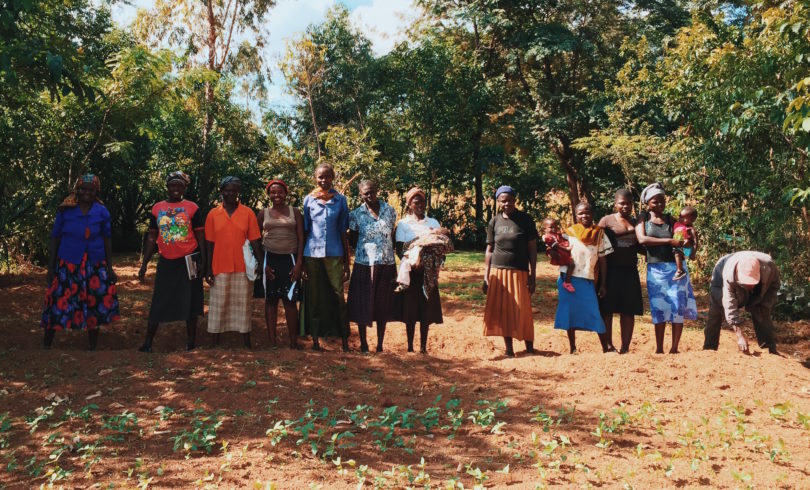
Editor’s note: A wide-reaching project in Western Kenya is having a profound effect on the lives of children and adults by tackling a complicated web of health issues. Meet some of the individuals benefiting from the PATH-led APHIAplus Western project, short for AIDS, Population, and Health Integrated Assistance, which is funded by the President’s Emergency Plan for AIDS Relief (PEPFAR) through the United States Agency for International Development (USAID).
In the hot sun of early August, the cowpeas, pumpkins, and sukuma wiki (similar to kale) have already sprouted in the community garden maintained by KalooAndingo, a support group for HIV-positive villagers in rural Homa Bay. Nearby looms the frame of a chicken coop they’ve built for the poultry farm they hope to establish later this year.
As they weave through the rows of freshly packed soil, two women from the group point to the bright green seedlings, and proudly note their ambitions for the vegetable garden.
“When they are ready, we will take these to sell in the market,” says Milka Amollo, gesturing to a patch of the covered sprouts. She is one of 26 members who are responsible for the community garden.
A community free of guilt and fear
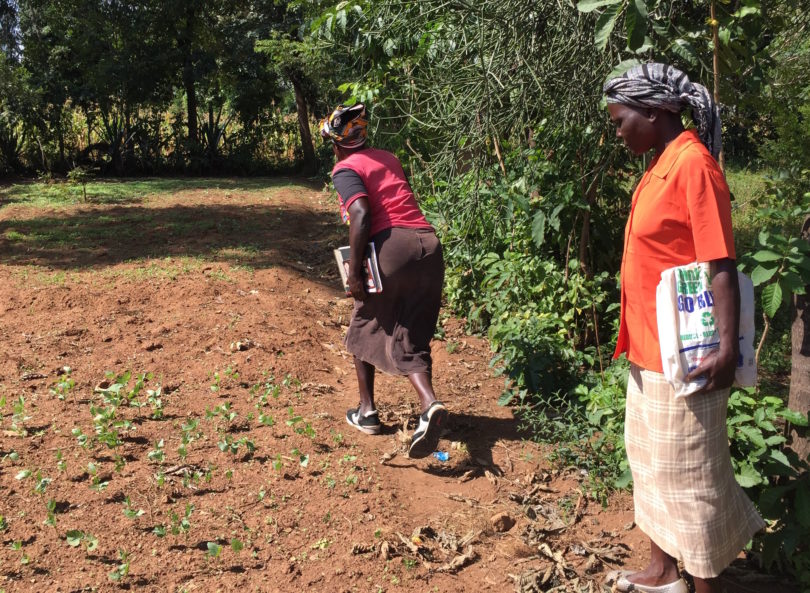
KalooAndingo was founded in 2015 by Julieta Akinyi Otieno, a peer educator who is herself HIV positive, under the APHIAplus Western project which is funded by the President’s Emergency Plan for AIDS Relief (PEPFAR) through the United States Agency for International Development (USAID). Like many HIV support groups that have preceded it, the members of this group benefit from the psychosocial support offered by one another’s companionship. The group also empowers its members to build their assets through village savings and loan trainings. It’s a simple concept: even in the face of new health technologies and drugs, sometimes the most effective interventions are the strong bonds and collective knowledge of a community.
In many ways, by simply meeting in such a visible forum, these 26 members are combatting the stigma surrounding HIV. KalooAndingo is founded on the belief that members should not harbor any fears or guilt because of their status. Each week, the group travels between one another’s homes—a procession of community members ranging in age and experience.
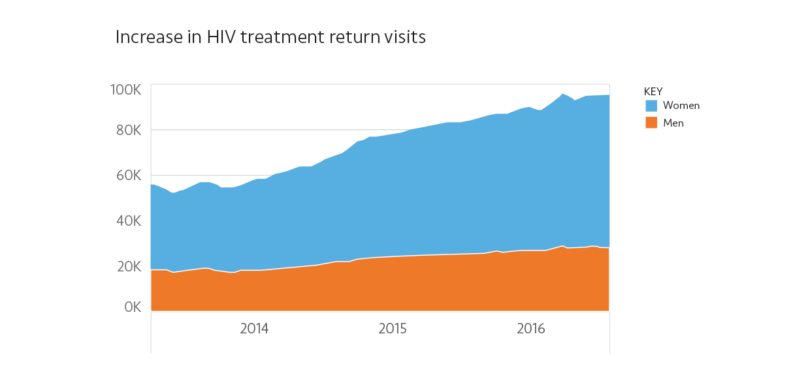
Disclosure is a condition for joining—participants must have shared their status and have agreed to test other members of their household. Before beginning their weekly sessions, participants affirm that they are HIV positive. Introductions are followed by a lively song and dance.
“You see, all their faces are bright,” says Beatrice Akinyi, home and community-based care officer for PATH’s Kenya Country Program.
“By coming out, we have learned that [there’s not just] one person living positively. There are 26 of us. And this is just one of the groups,” explains Mary Atieno, who says the encouragement of her peers has helped her overcome her initial fear of diagnosis.
The group has a series of mantras and rules they’ve outlined in a poster that they carry with them between sessions. The poster reads, “Family testing. Risk reduction. Condom use.” and is featured prominently on Elisabeth’s living room wall, where they are meeting. It’s a constant reminder that they can improve their quality of life if they abide by their treatment.
A second chance to live fully
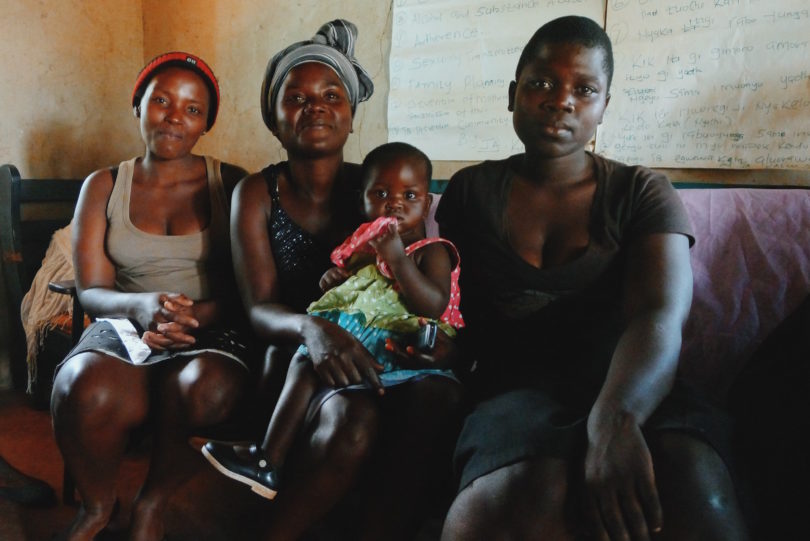
Before joining KalooAndingo many of its members equated HIV with a death sentence.
“I [used to] skip my drugs, because I didn’t know the importance of taking them,” says Raphael Auma. “When we came together, and I saw how healthy some of the members were, just by adhering to their drugs and keeping timelines for taking their medicine, it made me [want to] improve myself.”
Raphael and his peers often call one another to walk together to their weekly meetings. During sessions, they pass around their clinic cards to ensure each member has taken and restocked their drugs as promised. When one young member became pregnant last year, the group referred her to a support group for prevention of mother-to-child-transmission of HIV at Kauma Health Center, and encouraged her to complete prophylaxis. Another young woman claims the support group helped her exit several unhealthy relationships with men.
“When I joined the group, I learned the importance of sticking to one partner,” says Doreen Adhiambo. “Now I’m moving in the right direction. When I was alone, I felt so down. But through adherence, and the support of the group, I feel strong. I can do anything.”
Grouping together to ensure self-sufficiency
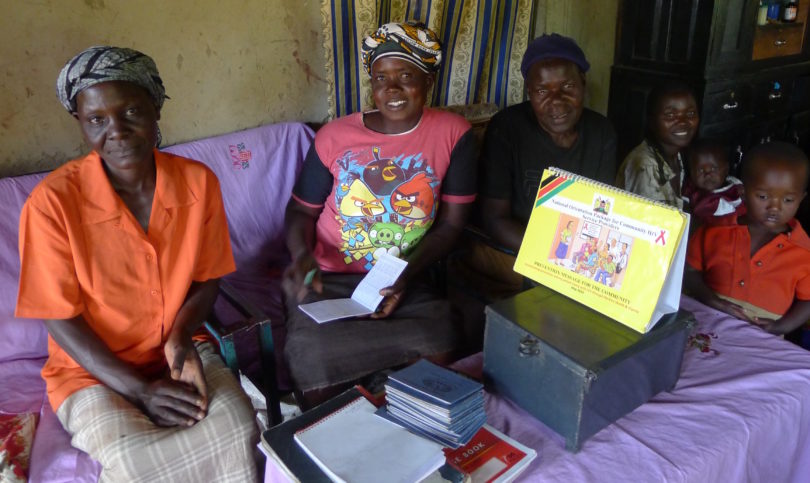
But it’s KalooAndingo’s income-generating activities that most set it apart from other HIV support groups. Without these activities, many members would not have the means to continue attending. Thanks to an APHIAplus Western–sponsored village savings and loan training, the group has been steadily saving their earnings. Every week, they set aside a small amount—each of the 26 members contributes 100 shillings—which they carefully enter into a ledger for bookkeeping. If members find themselves in need of financial assistance, the group draws from its social fund.
When Salome Akongo’s husband passed away several years ago, she had no way to afford her son’s school fees. Fortunately, the members of KalooAndingo swooped in to support her. They paid her son’s way through secondary school and enrolled him in a mechanics course.
Today her son is able to share his earnings with his mother—earnings that are reinvested in the group. Members have also purchased goats, chickens, and seedlings to sell in the market. To date, they’ve saved more than 100,000 shillings.
“VSL [village savings and loan] has really changed our lives,” says Martha. “We can be self-reliant. . . . Many of us have started our own small businesses, which we [attend to] every day, earning some cash so that we can feed our families.”
Later this year, the members of KalooAndingo will expand their community garden to include a poultry farm.
“I’ve found [a sense of] community that I didn’t have,” says Salome, “even before I was diagnosed with HIV.”


